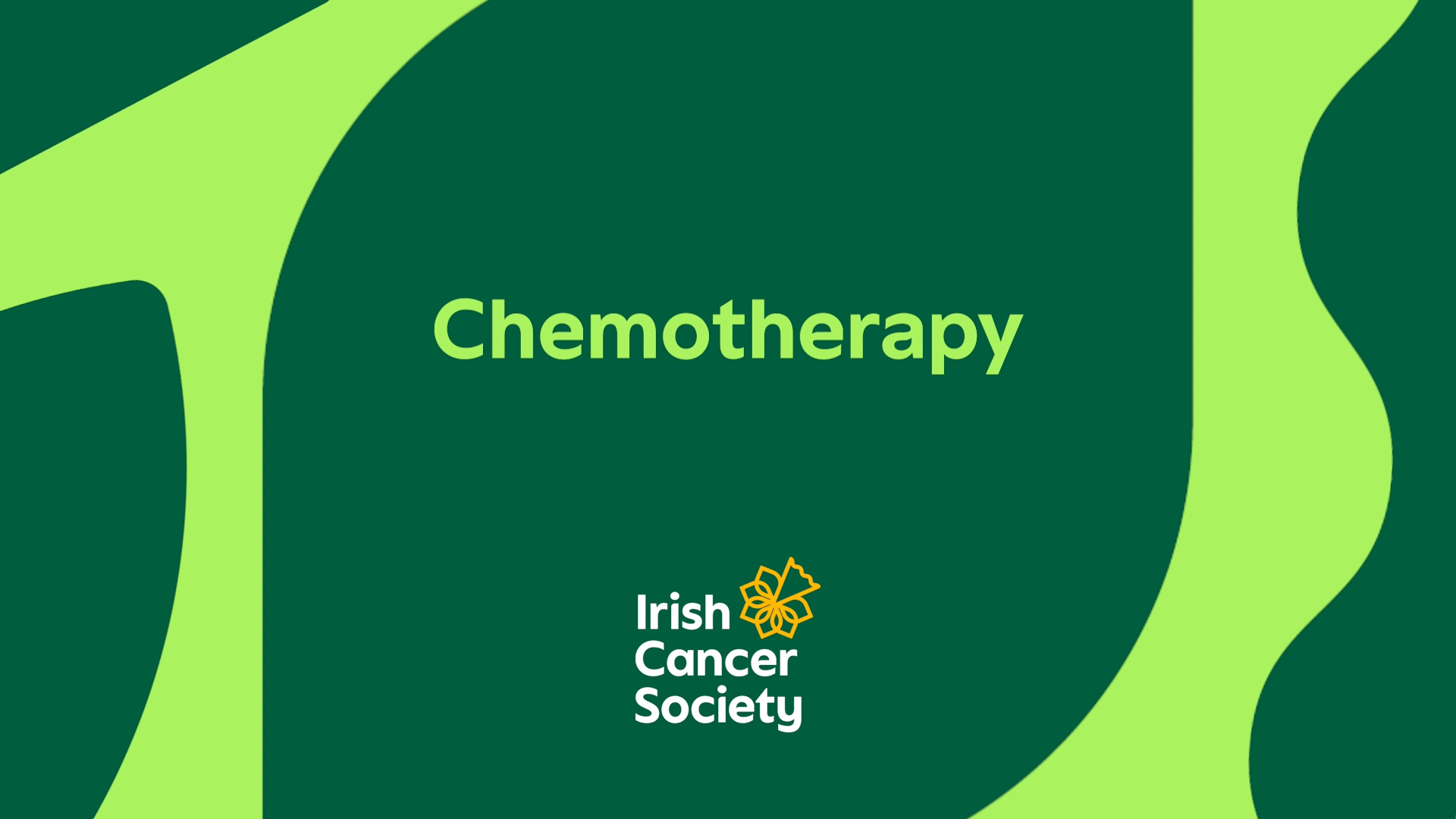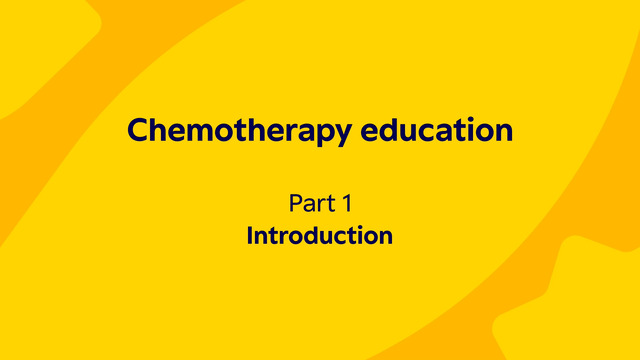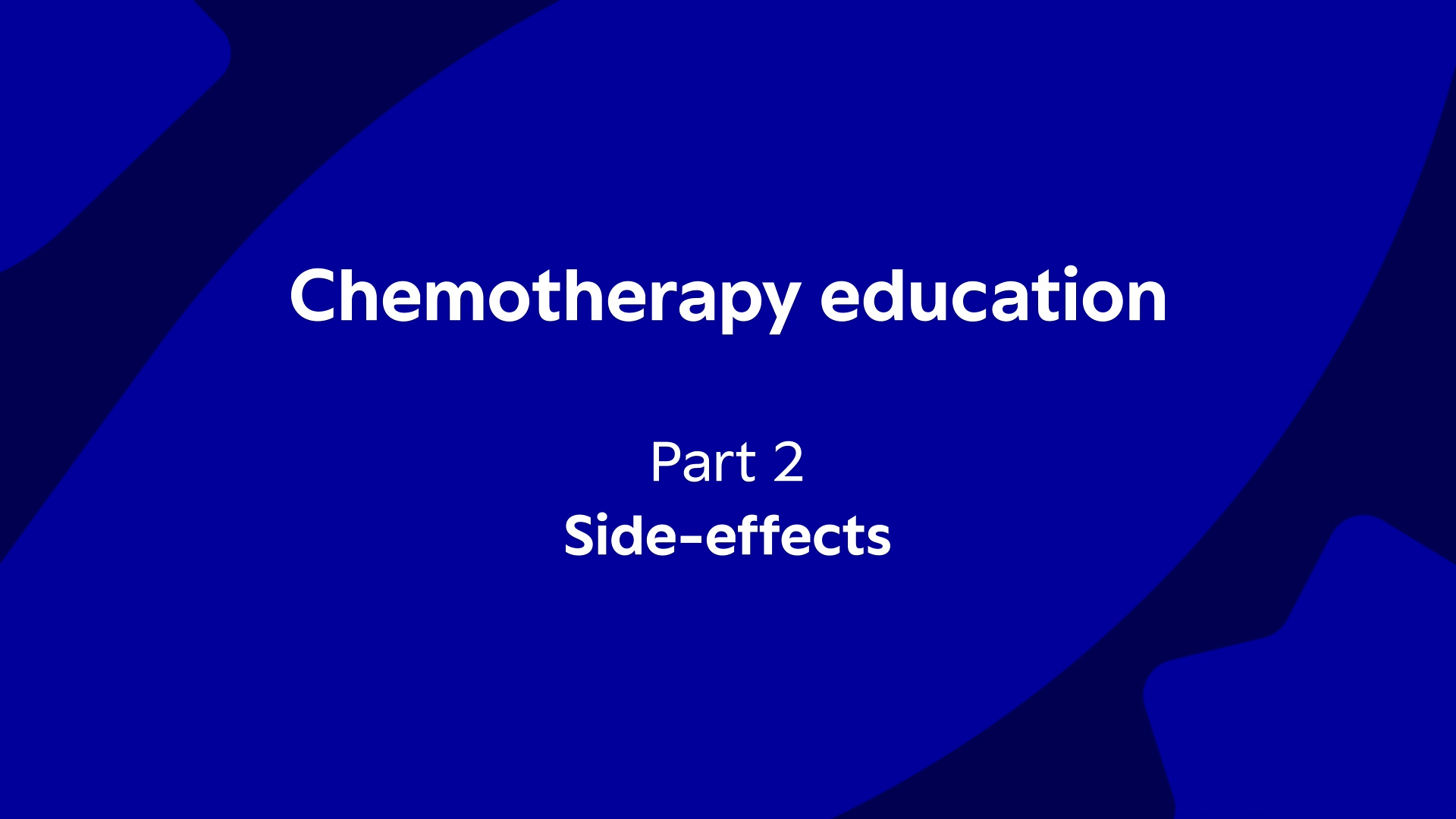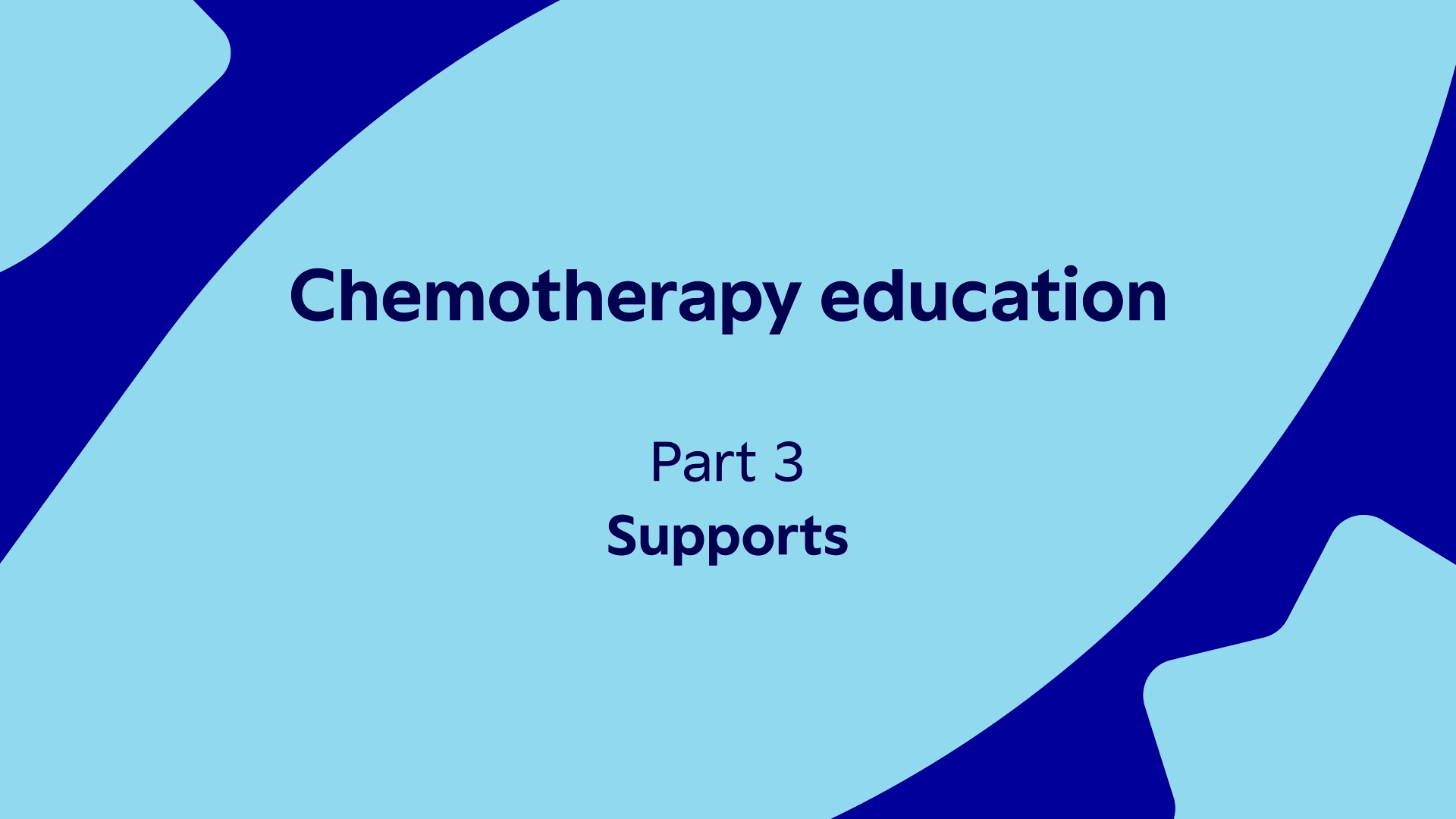Chemotherapy education Part 2: Side-effects
This video outlines what potential side-effects to expect during and after treatment as well as explains the importance of reporting side-effects.
0:09
Every drug has different side-effects and there is a risk that you will have side-effects from your treatment. The nurse that you meet with your doctor before you start your treatment will go through all these side-effects with you in detail and give you an idea what to expect for the specific drugs that you're getting and what to do about it if you do have these side-effects.
0:27
Side-effects occur from chemotherapy because of what the drugs are doing to the normal cells within your body. We're giving you chemotherapy to either reduce the risk of your cancer coming back or to control the cancer that's already there. But unfortunately, these drugs also affect the normal cells, and the side-effects that we see are because of this.
0:45
There are a range of side-effects, and the side-effects are associated with the drug that you're getting. And even within that, different people will have different experiences with specific drugs.
0:55
So the most important thing is to speak with your specialist nurse, to have an idea of what are the side-effects that are related to the treatment that you're receiving and what is the likelihood that you will have those side-effects.
1:06
If you feel unwell during your treatment, do not go to the GP. It is really important that you contact the hospital where you are having your treatment. You will have been given a hospital alert card with the contact numbers to call at any time, day or night, for advice and support on any symptoms you are experiencing.
1:23
You will have been given some booklets which you can go through, such as the Understanding Chemotherapy booklet. There are a range of resources available from the Daffodil Centre and the Irish Cancer Society. There is an online resource with www.cancer.ie and there is a section on the Irish Cancer Society website that goes through the side-effects of chemotherapy.
1:45
In this section we will outline the most common side-effects of chemotherapy. You may get some of the side-effects mentioned, but you are very unlikely to get all of them. Some side-effects are mild and easily treated.
1:57
Other side-effects can be harder to manage but can often be reduced or helped in some way. Your doctor or specialist nurse will give you advice about this.
2:06
Chemotherapy can reduce the number of blood cells produced in your body. We have 3 types of blood cells: White blood cells, which are essential for fighting infection, red blood cells, which contain haemoglobin to carry oxygen around the body, and platelets, which help to clot the blood and prevent bleeding. A reduced number of blood cells can cause side-effects.
2:27
Chemotherapy can make you more at risk of infection because chemotherapy affects the bone marrow where white blood cells, essential in fighting infection, are made. If you don't have enough white blood cells, even a minor infection like a cold can make you sick.
2:40
It's important to avoid contact with anyone else who is sick during this time. They may be infectious and could put you at risk of developing a serious infection.
2:48
You must take extra care during chemotherapy and look out for signs and symptoms of infection, including sweating or chills, having a high or low temperature, problems passing urine, a severe cough or sore throat, mouth ulcers, abdominal pain or diarrhoea, any redness, swelling or tenderness, especially around a wound, your port or PICC line.
3:10
If you experience any of these symptoms, it's important to contact your hospital. You will have been given phone numbers that you can use to contact the hospital 24 hours a day, 7 days a week.
3:21
Even if you don't have these symptoms but feel generally unwell, you must take your temperature, as a high or a low temperature could indicate infection. If you have a temperature of 37.5°C or higher, or a temperature of 36°C or lower, you must contact your hospital straight away.
3:39
Some over-the-counter medications, for example, paracetamol, lower your temperature, so they can hide or mask an infection. It's very important that you don't take these medications without discussing it with your doctor first.
3:51
Chemotherapy can reduce the red blood cells and platelets in your body. You will have regular blood tests, so your medical team will always be monitoring your bloods closely.
4:01
Always report any symptoms or side-effects. During your treatment, the team rely on feedback from you, as to how you feel, any side-effects, or any concerns you may have. It is important to always report any symptoms or side-effects to your nurse, doctor or medical team.
4:19
Some chemotherapy drugs cause infertility. That means that you can't have children. It may be temporary or permanent, depending on the drugs you have, your age and other factors. Before treatment starts, talk to your doctor or nurses about your chances of becoming infertile and your options, such as freezing sperm or eggs if necessary. Many people can have healthy babies after cancer treatment.
4:40
If you notice such symptoms as a throbbing pain, redness or swelling in your arm or leg, or a feeling of shortness of breath, especially when you take a deep breath or when you exert yourself, contact your doctor or nurse immediately, as this could be a sign of a blood clot. Most blood clots can be successfully treated if detected early.
5:00
Some chemotherapy drugs can make you feel or be sick. On the other hand, many people have no sickness at all with their chemotherapy. In fact, this is much less of a problem than it was in the past. If you do experience nausea or vomiting, there are some very helpful treatments.
5:16
You will be given anti-sickness drugs before your chemotherapy and to take at home, following your treatment. If these don't work, it is important that you let your nurse or medical team know so that they can give you more effective treatment.
5:30
The lining of our mouth is constantly rejuvenating and repairing damage caused to cells by eating and speaking. Chemotherapy can interfere with this process, leading to inflammation and mouth ulcers. Some drugs are more likely to contribute to a sore mouth than others. Your nurse will provide you with special instructions for mouth care while you are having chemotherapy.
5:50
Taste cells grow and divide quickly, so they are more easily damaged by chemotherapy. This can cause a temporary change in your sense of taste. Normal taste will return once you have finished your treatment.
6:02
Chemotherapy affects the lining of your gut, which can lead to constipation or diarrhoea. If you experience diarrhoea or constipation, it is important to continue to drink plenty of fluids to prevent dehydration and tell your nurse or doctor so that they can advise you on how best to manage it. They may give you some medications to help relieve the symptoms.
6:22
Hair loss can occur with some, but not all types of chemotherapy. The amount of hair lost will depend on the type of drug, or drugs used, the dose given, and your individual reaction to the drug. If hair loss occurs, it usually happens within 3 to 4 weeks of the chemotherapy treatment.
6:38
Although your hair may not fall out, it most likely will become weaker. Fortunately, most of the time, hair loss from chemotherapy is temporary. Your hair will start to grow back once your treatment has ended.
6:49
Some people having certain types of chemotherapy may be able to prevent hair loss by using a cold cap, also known as scalp cooling. It is not suitable for all patients and not all hospitals offer scalp cooling. Your doctor or nurse can tell you whether a cold cap is available in your hospital and if it might work for you.
7:09
Your skin can become more sensitive during and after chemotherapy, especially if you are having it in combination with other cancer drugs. You may find that your skin is drier, slightly discoloured. You may have a rash or an itch, which can be mild or more severe. It is important to tell your doctor or nurse about any skin conditions and they will be able to advise, as there are medicines and creams that can help.
7:32
Your nails may grow more slowly, become brittle or discoloured and break easily. You may notice white lines or ridges appearing across them. Using water-based nail varnish can help with this.
7:45
Some chemotherapy drugs can affect the nerve endings in your hands or feet. This can cause a feeling of tingling and numbness. It is important to report to your doctor and nurse if you experience this side-effect, as they may make some changes to your treatment to help reduce this side-effect.
8:02
While having chemotherapy and for some time afterwards, you might feel tired, fatigued or generally weak. This feeling will increase the longer you are on chemotherapy, but it will ease off gradually once the chemotherapy finishes. If you experience any of these symptoms, it's important to report back to your doctor or nurse as they will be able to advise.
8:26
A cancer diagnosis can be hard on you – mentally and emotionally. You may also worry about the emotional impact your illness will have on your loved ones. Give yourself time and space to deal with your emotions and get help if you need it.
8:39
You may experience some difficulty in remembering things or may find it hard to concentrate. This is known as brain fog. These symptoms can be frustrating for you, but usually improve once treatment is completed.
8:50
Sexual health is an important aspect of your wellbeing. Chemotherapy affects everyone differently. Some people carry on with their sex lives as normal during their treatment.
9:00
Others find their treatment interferes with how they feel emotionally or physically. Some people wonder if it is safe to have sex while having chemotherapy. It is usually safe to have sex during treatment. Even if you or your partner are taking the contraceptive pill, you should use a condom as an extra safeguard.
9:18
The chemotherapy drugs will have no long-term effects on your ability to have and enjoy sex. Although you may feel shy or embarrassed, you should speak to your doctor or nurse about any intimacy or sex-related issues you might have.
9:30
All side-effects can be managed with the support of your hospital teams. If you would like more detailed information about all the side-effects of cancer drugs, as well as hints and some tips on how to manage these side-effects, please contact our Support Line on 1800 200 700 or call in one of our Daffodil Centres and ask for a copy of our booklet ‘Understanding chemotherapy and other cancer drugs’
9:54
There's also information on the side-effects on our website: www.cancer.ie




